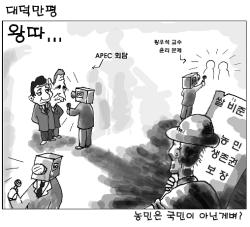
| Founded February 1, 1998 |
| (042)-869-2241 FAX: 869-2245 |
| Vol. 267, November 11, 2005 |

 |
|
||||||
| THE KAIST TIMES http://kaisttimes.com | |||||||

|
Several days ago, APEC (Asia Pacific Economic Cooperation) summit was held in Pusan. Leaders of APEC countries came together to work on important economic problems. It was a significant accomplishment to have Korea serve as the host country of this conference, and it gives us confidence that Korea can be a centrally important country in the Asia-Pacific area.
Korea and the other APEC countries must struggle with two big economic revolutions: globalization and free trade. Both require us to move from a local based community to bigger community and unite the power.
Accordingly, every country is busy making alliances. Europe is increasing its power through EU. Latin American countries are promoting a unified network. And Asia has APEC.
APEC is the largest of these economic blocks, and the biggest countries - US, China, Russia, Japan etc. - are members. The economic power of APEC is thus bigger than that of its competitors. At least that's what people anticipate for from APEC.
But while the whole world is moving toward economic integration, interests that oppose globalization are gaining strength. The many protests against this APEC summit are just one of the indications.
The number and influence of these groups resisting both globalization and free trade are increasing. Opposition to globalization is particularly strong in underdeveloped countries, although not exclusively confined there.
Even though globalization and free trade will contribute to future growth, there will produce side effects that we must understand. For example, several weeks ago there were Islamic riots in France that lasted for many days. This shocked not only France but the rest of the world. But if we look deeply into the causes of the unrest, we see that it stems from recession, unemployment, and other economic problems that are side effects of globalization. This is also why voters in West European countries have rejected the European constitution. They don't want companies moving to East European countries to find cheaper labor.
But I supposed it isn't any of my business.
Foreign laborers that overstay their welcome, jobs that are always temporary, and farmers burning their grain are the kinds of problems that globalization and free trade generate. They are therefore the kinds of problems we need to solve. This is especially true if globalization and free trade are inevitable. We must find wise ways to overcome these difficulties, not just demand one-sided sacrifices. That means thinking realistically about the problems and coming up with rational solutions.
[Art by Kyung-han Jang.][© 2005 KAIST. This work is distributed under the terms of a Creative Commons license. Permission is granted to copy, distribute, display, and perform the work in unaltered form, with attribution to KAIST, for noncommercial purposes only. All other rights, including commercial rights, are reserved.]